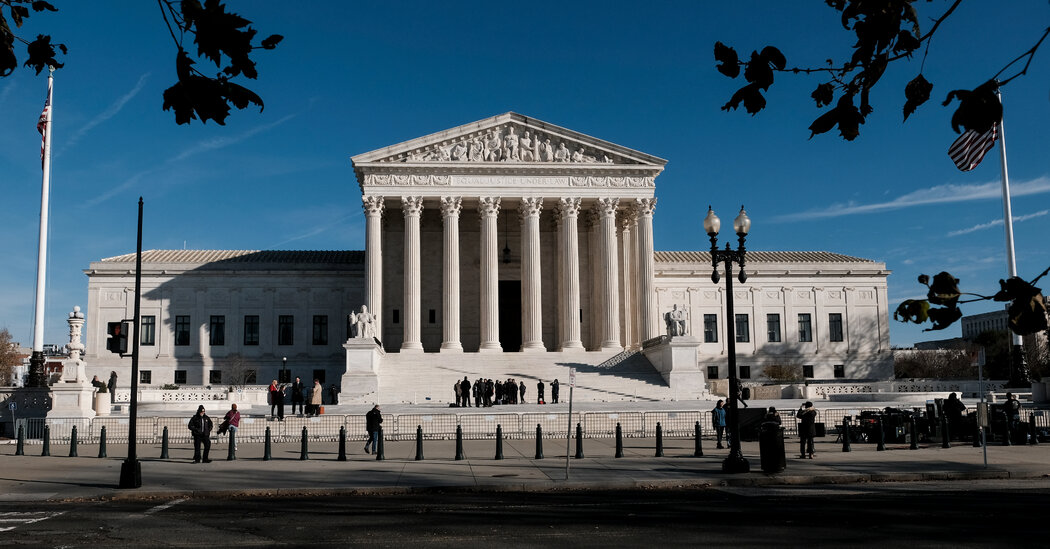WASHINGTON — Justice Samuel A. Alito Jr. issued a temporary stay on Friday ensuring that a common abortion pill would remain widely available while the Supreme Court decides whether to grant a formal stay. The interim stay will expire at midnight on Wednesday.
Such a stay is meant to preserve the status quo while the justices study the briefs and lower court rulings, and it did not forecast how the justices would ultimately rule.
Justice Alito, the member of the court responsible for overseeing the appeals court whose ruling is at issue, ordered the groups challenging the Food and Drug Administration’s approval of the pill to file their brief by Tuesday at noon.
The move followed an emergency application filed Friday morning by the Biden administration asking the justices to intervene.
The administration’s brief, in the first major abortion case to reach the justices since they eliminated the constitutional right to abortion in June, asked the court to pause parts of an appeals court ruling that had limited the availability of the pill, mifepristone.
“If allowed to take effect, the lower courts’ orders would upend the regulatory regime for mifepristone, with sweeping consequences for the pharmaceutical industry, women who need access to the drug, and F.D.A.’s ability to implement its statutory authority,” the brief said.
In a second emergency application, filed by Danco Laboratories, which makes the branded version of mifepristone, the company’s lawyers said the justices should defer to the F.D.A.’s scientific expertise in determining that the drug was safe and effective.
On Wednesday night, a three-judge panel of the U.S. Court of Appeals for the Fifth Circuit, in New Orleans, issued a mixed decision, staying the most sweeping aspects of a decision from Judge Matthew J. Kacsmaryk that would have wholly overridden the Food and Drug Administration’s approval of the pill.
But the appeals court, in an unsigned order from a divided three-judge panel, temporarily let stand other aspects of Judge Kacsmaryk’s ruling, including by requiring in-person visits with doctors, rolling back the availability of the pills from the first 10 weeks of pregnancy to seven weeks and barring dispensing them by mail.
The panel’s ruling was provisional, and the court put the appeal itself on a relatively fast track, scheduling arguments for May 17.
The Push to Restrict Abortion Pills
A federal judge in Texas invalidated the F.D.A.’s approval of an abortion pill, mifepristone. The decision could make it more difficult for patients to obtain abortions.
- Dueling Rulings: On the same day as the Texas decision, a federal judge in Washington State issued an opposing ruling in a different case saying that the F.D.A. not limit access to mifepristone in 18 jurisdictions.
- Under Review: After an appellate ruling in response to the Texas decision imposed barriers to abortion pill access, the Supreme Court is poised to consider whether medication abortion can be curtailed in states where abortion is legal. At first blush, the Texas decision’s chances of surviving review seem promising. But the justices may think twice before embracing it, legal scholars say.
- Stockpiling Abortion Pills: As the ruling could affect availability even where abortion is legal, states led by Democrats have been scrambling to adjust to a possible future without mifepristone.
Had Judge Kacsmaryk’s ruling fully come into force, it would have severely disrupted the availability of mifepristone, part of the most commonly used method for ending pregnancies in the United States.
The case was brought by several doctors and medical groups, including the Alliance for Hippocratic Medicine, which was incorporated in August in Amarillo, Texas, where the case was filed. Judge Kacsmaryk, a Trump appointee who is a longtime opponent of abortion, is the only federal judge in the Amarillo division in the U.S. District Court of the Northern District of Texas.
The appeals court majority wrote that the statute of limitations appeared to bar a challenge to the F.D.A.’s initial approval of the pill in 2000. But it said that later expansions of access to the pill were properly before the judge and that there were authentic safety concerns warranting suspension of regulations making it easier to obtain the pills.
The majority added that the plaintiffs appeared to have standing to sue because they might have to treat complications from the use of the pill.
In the Biden administration’s emergency application in the Supreme Court, Solicitor General Elizabeth B. Prelogar, representing the F.D.A., wrote that the plaintiffs lacked standing to challenge a drug they neither take nor prescribe and that they had provided no basis for second-guessing the agency’s scientific judgment.
Rather, she wrote, they relied on implausible speculation.
“F.D.A.’s approval of the drug does not require them to do or refrain from doing anything,” she wrote. “Yet the Fifth Circuit held that the associations have standing because some of their members might be asked to treat women who are prescribed mifepristone by other providers and who then suffer an exceedingly rare adverse event.”
In the emergency application by Danco Laboratories, the company’s lawyers said the appeals court’s ruling had created “regulatory chaos.”
“Leaving the Fifth Circuit’s ruling in place will irreparably harm Danco, which will be unable to both conduct its business nationwide and comply with its legal obligations,” the company’s brief said. “The lack of emergency relief from this court will also harm women, the health care system, the pharmaceutical industry, states’ sovereignty interests and the separation of powers.”
Judge Kacsmaryk once worked for First Liberty Institute, which says it is the largest legal organization in the nation focused exclusively on defending religious freedom. Democrats voted against confirming him to the bench in 2019 because of his history of opposing L.G.B.T.Q. rights.
In his ruling, Judge Kacsmaryk adopted the language of abortion opponents, referring to abortion providers as “abortionists,” to the challenged procedure as “chemical abortion” and to the fetus as an “unborn human” or “unborn child.” Legal scholars said the judge had relied on questionable scientific studies.
The government’s emergency application was harshly critical of the judge’s ruling.
“The district court countermanded a scientific judgment F.D.A. has maintained across five administrations; nullified the approval of a drug that has been safely used by millions of Americans over more than two decades; and upset reliance interests in a health care system that depends on the availability of mifepristone as an alternative to surgical abortion for women who choose to lawfully terminate their early pregnancies,” Ms. Prelogar wrote.
The application said the ruling was also novel. “To the government’s knowledge,” she wrote, “this is the first time any court has abrogated FDA’s conditions on a drug’s approval based on a disagreement with the agency’s judgment about safety — much less done so after those conditions have been in effect for years.”
The case has returned the Supreme Court to an issue it not long ago said it was ceding to elected officials in Dobbs v. Jackson Women’s Health Organization, which overturned Roe v. Wade, the 1973 decision that established a constitutional right to abortion. Writing for the majority, Justice Alito wrote that the political branches, rather than the courts, should set abortion policy.
The Dobbs decision concerned the Constitution, while Judge Kacsmaryk’s ruling mostly turned on principles of administrative law. But the new case demonstrated that legal disputes over abortion will continue to engage the justices.
The stakes are high. More than five million women have used mifepristone to terminate their pregnancies in the United States, and many studies have found it to be safe and effective. The drug is also approved for use in dozens of other countries.
In the United States, the protocol typically involves mifepristone in combination with a second drug, misoprostol, that are used in the first 10 weeks of pregnancy. About 60 percent of abortions in that time employ the two drugs rather than surgery.
The first drug blocks the effects of progesterone, a hormone without which the lining of the uterus begins to break down. The second one, taken 24 to 48 hours later, induces contractions of the uterus that expel its contents.
If access to mifepristone is limited, abortion providers may rely solely on misoprostol, which can be used on its own but is somewhat less effective and more prone to cause side effects.
The appeals court’s order is in conflict with ones issued by a federal judge in Washington State in another lawsuit related to mifepristone. That lawsuit, filed against the F.D.A. by Democratic attorneys general from 17 states and the District of Columbia, challenged extra restrictions that the agency imposes on mifepristone and asked the judge to prevent it from limiting access to the drug.
Judge Thomas O. Rice of the U.S. District Court for the Eastern District of Washington, an Obama appointee, did not lift the additional restrictions but ordered the F.D.A. to maintain the status quo. He blocked the agency from curbing the availability of mifepristone in the states that filed the lawsuit.
Lawyers for Danco wrote that the dueling orders put it “in an impossible position.”
The F.D.A., they wrote, “cannot permit Danco to simultaneously operate two separate distribution networks for two different parts of the country; that simply is not how the federal regulation of pharmaceuticals works.”
















Leave a Reply